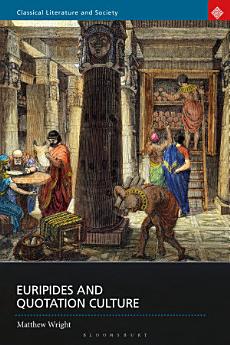Euripides and Quotation Culture
Matthew Wright
2024 uzt. · Bloomsbury Publishing
Liburu elektronikoa
224
orri
reportBalorazioak eta iritziak ez daude egiaztatuta Lortu informazio gehiago
Liburu elektroniko honi buruz
Presenting a new approach to Euripides' plays, this book explores the playwright's ancient tragedies in relation to quotation culture. Treating extant works and lost works side-by-side, Matthew Wright presents a selective survey of ways in which Euripidean tragedy was quoted within antiquity, both in social contexts (on the comic stage, at symposia, in law courts, in education) and in different literary genres (drama, biography, oratory, philosophy, literary scholarship, history and anthologies). There is also a discussion of the connection between quotability and classic status, where Wright asks what quotations can tell us about ancient reading habits. The implication is that Euripides actively participated in quotation culture by deliberately making certain portions of his plays stand out as especially quotable.
Within classical antiquity, Euripides was the most widely quoted author apart from Homer. His plays are full of 'quotable quotes', which were repeated so often that they acquired a life of their own. Hundreds of famous verses from Euripidean drama circulated widely within the ancient world, even after the plays in which they originally featured became forgotten or vanished completely. Indeed, the majority of Euripides' tragedies now survive only in the form of scattered quotations, otherwise known to us as 'fragments'. It is this corpus of fragmentary quotations, along with his extant plays, that makes Euripides such an interesting case study in the world of quotation culture. This book is the first of its kind to understand Euripides' work through this lens, as well as opening up quotation culture as a major theme of interest within classical scholarship.
Within classical antiquity, Euripides was the most widely quoted author apart from Homer. His plays are full of 'quotable quotes', which were repeated so often that they acquired a life of their own. Hundreds of famous verses from Euripidean drama circulated widely within the ancient world, even after the plays in which they originally featured became forgotten or vanished completely. Indeed, the majority of Euripides' tragedies now survive only in the form of scattered quotations, otherwise known to us as 'fragments'. It is this corpus of fragmentary quotations, along with his extant plays, that makes Euripides such an interesting case study in the world of quotation culture. This book is the first of its kind to understand Euripides' work through this lens, as well as opening up quotation culture as a major theme of interest within classical scholarship.
Egileari buruz
Matthew Wright is Professor of Greek at the University of Exeter, UK. He has published widely on Greek tragedy and comedy, including The Lost Plays of Greek Tragedy (Volume 2): Aeschylus, Sophocles and Euripides (Bloomsbury, 2018), The Lost Plays of Greek Tragedy (Volume 1): Neglected Authors (Bloomsbury, 2016) and The Comedian as Critic (Bloomsbury, 2012).
Baloratu liburu elektroniko hau
Eman iezaguzu iritzia.
Irakurtzeko informazioa
Telefono adimendunak eta tabletak
Instalatu Android eta iPad/iPhone gailuetarako Google Play Liburuak aplikazioa. Zure kontuarekin automatikoki sinkronizatzen da, eta konexioarekin nahiz gabe irakurri ahal izango dituzu liburuak, edonon zaudela ere.
Ordenagailu eramangarriak eta mahaigainekoak
Google Play-n erositako audio-liburuak entzuteko aukera ematen du ordenagailuko web-arakatzailearen bidez.
Irakurgailu elektronikoak eta bestelako gailuak
Tinta elektronikoa duten gailuetan (adibidez, Kobo-ko irakurgailu elektronikoak) liburuak irakurtzeko, fitxategi bat deskargatu beharko duzu, eta hura gailura transferitu. Jarraitu laguntza-zentroko argibide xehatuei fitxategiak irakurgailu elektroniko bateragarrietara transferitzeko.








